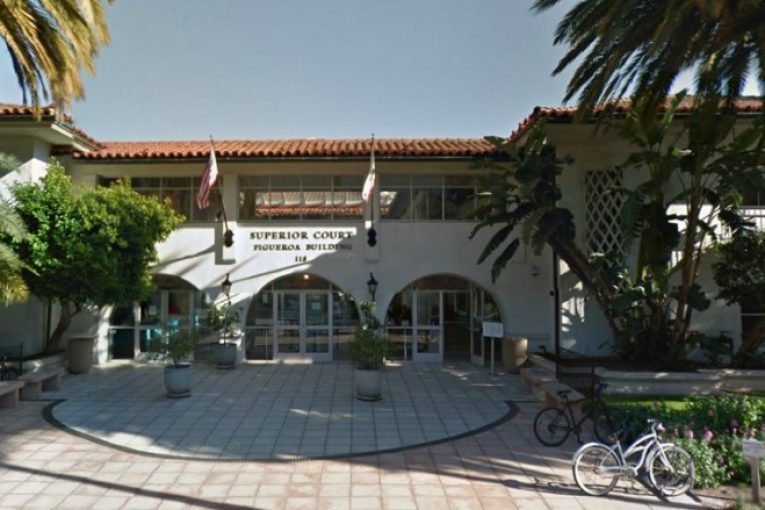
 By Joshua Cenzano
By Joshua Cenzano
SANTA BARBARA, CA – Fernando Gutierrez stood in Santa Barbara County Superior Court last week to answer for possession and distribution of firearms connected with a double homicide committed by members of a gang that he is alleged to be leading.
The murders allegedly took place on Jan. 3 of last year, in which three suspects have been implicated. These three suspects, Angel Varela, Oscar Trujillo, and a juvenile referred to in court only by his initials E.P., are alleged to be members of the Carpas gang of Carpinteria and closely associated with Gutierrez.
The police implicated Gutierrez in April following the murders by executing a search of his residence and finding weapons and gang paraphernalia linking Gutierrez to the crime and the suspects.
During Gutierrez’s preliminary hearing Wednesday, Defense Attorney Robert Sanger argued the search was improper and inadmissible since the affiant who submitted the warrant for approval misled, by omitting specific key facts, the magistrate into finding probable cause to search his client’s home.
Detective Andre Miller of the Santa Barbara Police Department testified in court as the investigator who submitted the affidavit to Judge Von Deroian for consideration.
As chief investigator of the double homicide, he detailed to the court the steps that led him to consider Gutierrez culpable for purchasing and providing the weapons used in the murders.
He provided records of text messages between Gutierrez and Angel Varela over a period of six months prior to the murders, which included references to purchasing a “toy” and “AR,” which Miller affirmed are likely references to firearms.
He also described the evidence he had gathered, which indicated that Gutierrez was closely associated with the three murder suspects, including social media posts and text communications.
The prosecution introduced an expert on gangs and gang culture to solidify this line of reasoning; Detective Gonzalez, an expert in his field, affirmed it is common for gang members to hide guns in each other’s residences after the commission of a crime.
Since it was known that Gutierrez was closely associated with the three suspects, the prosecution argued that this “totality of evidence” provided the necessary substantial basis for believing that probable cause existed, which is a relevant standard under modern precedent.
Additionally, Detective Gonzalez further testified to Gutierrez’s position within the gang.
The detective said he had been acquainted with Gutierrez through his occupation since 2000 when Gutierrez was allegedly still a young member of the Carpas gang. After several encounters over the years, Gonzalez told the court that Gutierrez is “almost the leader of the gang” and that he “has a lot of clout.”
This testimony gave additional credence to the allegation that Gutierrez orchestrated the homicides to some extent as leader of the gang.
These testimonies formed the basis of the affidavit submitted to Judge Deroian to authorize the search of Gutierrez’s residence, which ultimately implicated him for the murders.
However, upon cross-examination of Detective Miller, it became known that Gutierrez had never been considered as a murder suspect since there was video evidence of him across town nine minutes before the murders occurred.
When drafting the search and arrest warrants for consideration, Miller conceded that he did not personally believe that Gutierrez had been present at the crime scene based on this evidence and that this information was not included in the warrant.
Defense Attorney Sanger also pointed out that the three suspects of the murder are Gutierrez’s nephews, a fact which was not included in the affidavit and could have possibly provided an alternative explanation for their close association.
Miller responded he was unaware of the exact nature of their familial relationship but included in his affidavit the existence of some relation between the four individuals.
Considering these omissions, Sanger argued to the court that the inclusion of these facts could have reasonably altered the magistrate’s decision as to whether or not probable cause to search Gutierrez’s home existed.
The court affirmed that courts reviewing the issuance of search and arrest warrants need not revisit whether probable cause existed de novo. They only need to consider if a substantial basis existed for so believing.
Under this standard, the prosecution argued the evidence presented in Wednesday’s hearing nonetheless constituted a substantial basis for believing probable cause existed, and that Miller’s minor omissions do not constitute inadmissible intentional false statements under Franks.
Judge Clifford Anderson III ultimately agreed with the prosecution and denied the defense motion to suppress the search warrant.
“I don’t believe that if it was included that the defendant was not a suspect that it would have changed the outcome,” said the judge when delivering his decision.
“I don’t believe a statement detailing he was the uncle of the suspects would affect the calculus of the determination of probable cause,” added Judge Anderson, addressing both points of objection the defense raised.
The judge ultimately ruled that there was a strong suspicion that the crimes Gutierrez is accused of were committed and that Gutierrez had committed those crimes.
He will be arraigned on Feb. 3 for possession of a firearm and ammunition as a convicted felon, participation in a criminal street gang and possession of a deadly weapon, five felony counts in total.

